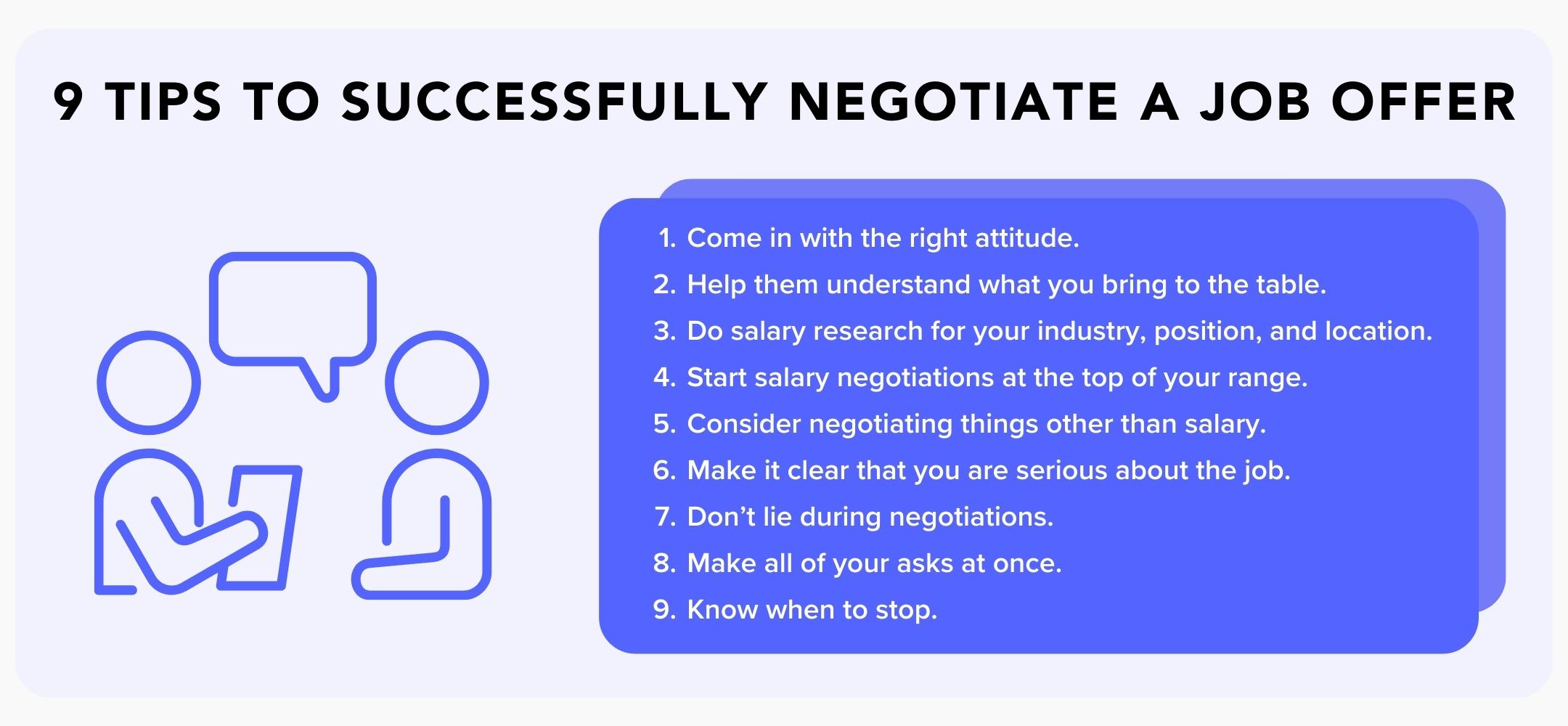Getting a job offer is an exciting time! However, those feelings of success and anticipation can quickly fade when you realize that the offered salary isn’t exactly what you were hoping for.
That leaves you with three options: Accept the less-than-satisfactory offer that the company presented, decline it, or negotiate for better terms, whether it be for more money or non-monetary benefits such as the option to work from home.
Negotiating a job offer can be an intimidating thought— but did you know that 84% of employers say that they expect job applicants to negotiate salary during the interview stage? Furthermore, 87% reported that they never rescinded a job offer following salary negotiations.
If you feel that your expertise, skills, and labor are worth more, you could be leaving money on the table if you aren’t negotiating. If you approach negotiations the right way, you could come away with a job that you love and a salary that you are happy with.

9 Tips for Negotiating a Job Offer
We’ve rounded up nine tips for negotiating a job offer.
1. Come in with the right attitude.
Attitude is everything when it comes to negotiation. Even if the salary offer was much lower than you were expecting, don’t assume that it is a personal attack on your skills and qualifications. Instead of negotiating defensively or being on the attack, let this be an opportunity to advocate for yourself in a calm, professional manner.
When negotiating, do:
- Be friendly, polite, and respectful
- Be confident, but not pushy, about the salary that you want
- Maintain positive and open body language throughout the conversation
You should be careful that you are not:
- Demanding or egotistical
- Unrealistic with your expectations
- Using ultimatums to negotiate
It’s important to bring positivity to the table because, at the end of the day, you are negotiating with another human being— not a business entity.
RELATED: How to Ask for a Raise When You Are Underpaid
2. Help them understand the value that you bring to the table.
It’s not enough to simply put a number on the table— you must also help the hiring manager see why you are worth that amount.
There are several ways that you can do this. For one, you can highlight your accomplishments at your current job and highlight how you can do the same for this company. You can also reiterate things like your education background, specific areas of expertise that you have, and licenses and certification to show why you’re worth more than other candidates.
3. Do salary research for your industry, position, and location.
You may also want to support the argument for your value with some salary data.
Before you start negotiating a job offer, do some research on other employers in your industry to learn what others in your position earn. Account for factors such as years of experience and location as these can greatly influence salary ranges. If your offer is below the averages, use these numbers as leverage in your argument.
4. Start salary negotiations at the top of your range.
Think about the range of salary that you’d be comfortable taking. When making your counteroffer to the employer, start at the highest number in your range. (Provided that it is reasonable, of course.)
If the employer decides to accept this number— great! You’ll now be making a number you’re really happy with. However, if they decide to negotiate that down and give you another offer, you may still end up with an amount that is in your acceptable range. If you start negotiations in the mid to low range, you may end up with a number that is not going to work.
5. Consider negotiating things other than salary.
If an employer has made it clear that they don’t have the budget to bump up your salary offer, consider your other options. Things that you can negotiate include:
- The ability to work remotely
- Your starting date
- Funds to relocate
- Stock options
- A better job title
- Flexible work hours
- Stipend for healthcare if they do not offer health insurance
If you really want to work for the company, getting extra non-monetary perks may make up for a lower salary than you were hoping for.
RELATED: What Employee Benefits to Look for When Job Hunting
6. Make it clear that you are serious about the job.
Some people try to leverage the fact that they have other job offers in negotiations in hopes that it makes them a more desirable candidate. While you can be honest that yes, other companies have offered you a position, you want it to be clear that you are serious about working for them.
If you suggest that you would be just as happy to go somewhere else if your expectations aren’t met, an employer can easily get the impression that you are just in it for the money and rescind your offer altogether.
7. Don’t lie during negotiations.
Don’t lie in order to get a higher offer. Not only is it morally wrong, but it can really come back to hurt your chances at landing the job altogether. You always want to be truthful about your current salary, whether or not you have other job offers on the table, and your experience and abilities.
8. Make all of your asks at once.
You may be trying to negotiate several other things in addition to your salary, such as hours or the ability to work remotely. Don’t wait until one negotiation is settled to start another one. If you’re making more than one ask, do it all at once.
9. Know when to stop.
Generally, an employer won’t rescind a job offer simply because you’ve politely tried to negotiate the offered salary. They may, however, rescind your offer if you drag on the process or are negotiating just for the sake of negotiating. Understand the employer’s constraints and that there may be things that they can’t be flexible on now. If you aren’t able to compromise, politely decline the offer so that the employer can move on with the hiring process for another candidate.
Finding fair compensation
Here at JobSage, we’re setting out to build an employer review site around things that matter most to jobseekers— inclusion, growth, purpose, feedback, flexibility, and compensation. We want to help you find the right employer by getting answers to the questions you care about. Join JobSage for guidance in your job search or to leave a review for your current employer to create a more open, transparent conversation in and around the workplace.
